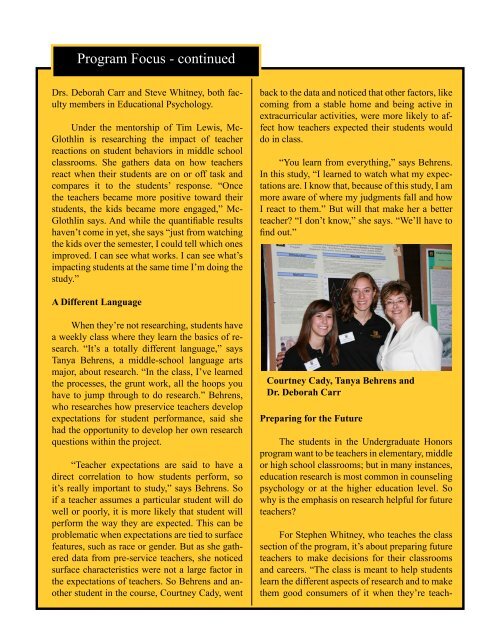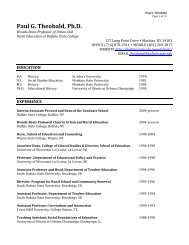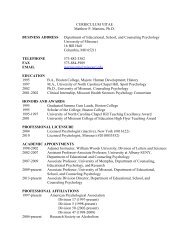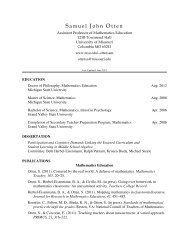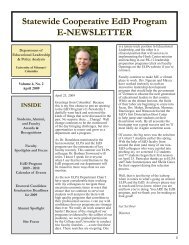Educational, School, & Counseling Psychology E-Newsletter Inside
Educational, School, & Counseling Psychology E-Newsletter Inside
Educational, School, & Counseling Psychology E-Newsletter Inside
Create successful ePaper yourself
Turn your PDF publications into a flip-book with our unique Google optimized e-Paper software.
Program Focus - continued<br />
Drs. Deborah Carr and Steve Whitney, both faculty<br />
members in <strong>Educational</strong> <strong>Psychology</strong>.<br />
Under the mentorship of Tim Lewis, Mc-<br />
Glothlin is researching the impact of teacher<br />
reactions on student behaviors in middle school<br />
classrooms. She gathers data on how teachers<br />
react when their students are on or off task and<br />
compares it to the students’ response. “Once<br />
the teachers became more positive toward their<br />
students, the kids became more engaged,” Mc-<br />
Glothlin says. And while the quantifiable results<br />
haven’t come in yet, she says “just from watching<br />
the kids over the semester, I could tell which ones<br />
improved. I can see what works. I can see what’s<br />
impacting students at the same time I’m doing the<br />
study.”<br />
A Different Language<br />
When they’re not researching, students have<br />
a weekly class where they learn the basics of research.<br />
“It’s a totally different language,” says<br />
Tanya Behrens, a middle-school language arts<br />
major, about research. “In the class, I’ve learned<br />
the processes, the grunt work, all the hoops you<br />
have to jump through to do research.” Behrens,<br />
who researches how preservice teachers develop<br />
expectations for student performance, said she<br />
had the opportunity to develop her own research<br />
questions within the project.<br />
“Teacher expectations are said to have a<br />
direct correlation to how students perform, so<br />
it’s really important to study,” says Behrens. So<br />
if a teacher assumes a particular student will do<br />
well or poorly, it is more likely that student will<br />
perform the way they are expected. This can be<br />
problematic when expectations are tied to surface<br />
features, such as race or gender. But as she gathered<br />
data from pre-service teachers, she noticed<br />
surface characteristics were not a large factor in<br />
the expectations of teachers. So Behrens and another<br />
student in the course, Courtney Cady, went<br />
back to the data and noticed that other factors, like<br />
coming from a stable home and being active in<br />
extracurricular activities, were more likely to affect<br />
how teachers expected their students would<br />
do in class.<br />
“You learn from everything,” says Behrens.<br />
In this study, “I learned to watch what my expectations<br />
are. I know that, because of this study, I am<br />
more aware of where my judgments fall and how<br />
I react to them.” But will that make her a better<br />
teacher? “I don’t know,” she says. “We’ll have to<br />
find out.”<br />
Courtney Cady, Tanya Behrens and<br />
Dr. Deborah Carr<br />
Preparing for the Future<br />
The students in the Undergraduate Honors<br />
program want to be teachers in elementary, middle<br />
or high school classrooms; but in many instances,<br />
education research is most common in counseling<br />
psychology or at the higher education level. So<br />
why is the emphasis on research helpful for future<br />
teachers?<br />
For Stephen Whitney, who teaches the class<br />
section of the program, it’s about preparing future<br />
teachers to make decisions for their classrooms<br />
and careers. “The class is meant to help students<br />
learn the different aspects of research and to make<br />
them good consumers of it when they’re teach-


